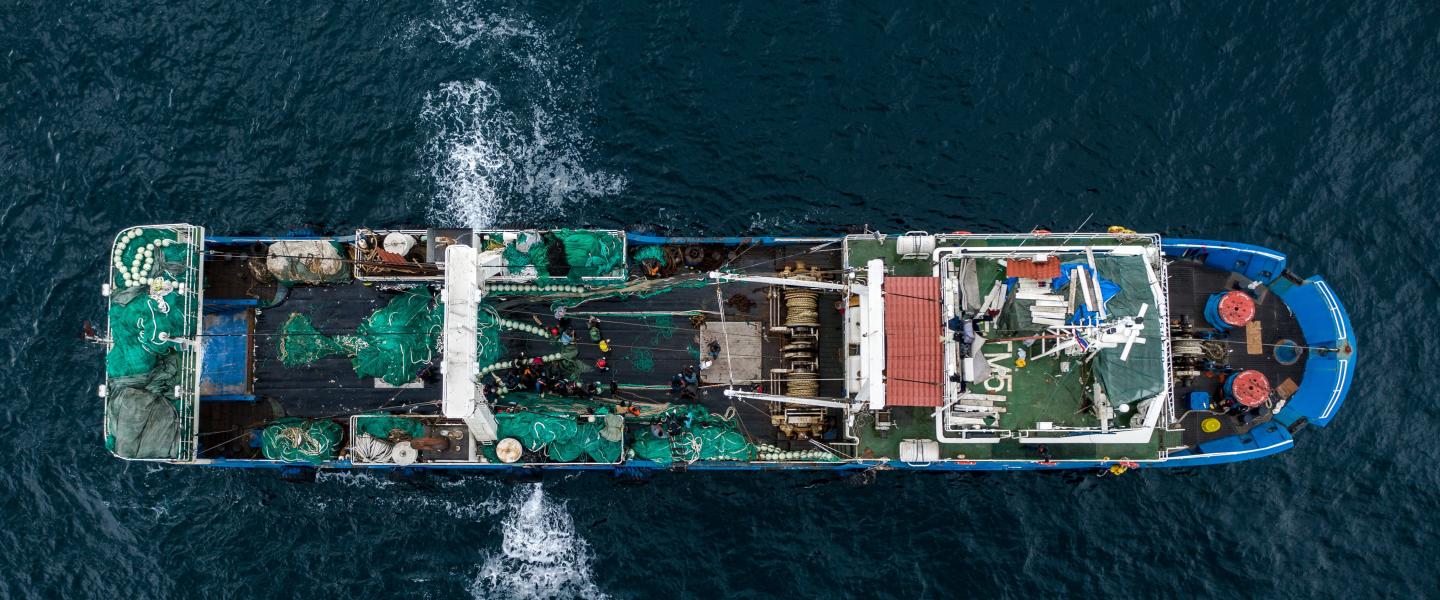In a recent Sky News interview, our CEO, David Hammond, further exposed the stark reality of fishing abuses and the challenges of enforcement at sea.
"The reality is that because it's out of sight, out of mind, you know, a lot of that is happening over the horizon, quite literally. Nobody knows what's going on. So you then have the issue of enforcement, and there is a massive lacuna in the enforcement issue from coastal states and international waters. And without enforcement, you don't have a deterrent effect, and without a deterrent effect, you have impunity."

Revealing the Gruesome Side of the Seafood Industry
A comprehensive four-year investigation conducted by The Outlaw Ocean Project has unveiled the shocking details of human rights abuses, forced labour, and heart-breaking tragedies occurring on Chinese-flagged fishing vessels. This eye-opening reporting brings to the forefront the grim truth about the global seafood industry, where crew members face exploitation, deprivation, perilous conditions, and even loss of life.
China's Dominance and the Concerns Raised
With China's distant water fishing fleet boasting around 6,500 vessels, it has asserted its dominance in the global seafood industry. However, concerns have been raised about the fleet's behaviour, sheer size, and its potential for human rights violations, environmental crimes, and broader geopolitical implications.
Horror Stories from the High Seas
The investigation exposes horrifying details about over 100 Chinese-flagged squid ships allegedly entangled in human rights abuses. These inhumane practices include debt bondage, wage withholding, excessive working hours, crew abandonment, forced labour, and physical abuse.
Shockingly, seafood from these vessels has found its way to supermarket shelves in over 36 countries, including major European importers.
Today, seafood retailers are increasingly being forced to look at the third-party assurances that they are depending on, most notably from voluntary seafood certifications, standards and ratings and which HRAS has been focusing independent reviews on.
The Deadliest of Professions
Fishing is already notorious as one of the world's deadliest professions, with an estimated 100,000 fatalities each year, as recently reported by The Fish Safety Foundation and which builds on existing UN FAO figures of between 28-32,000 annual deaths. However, the investigation delves into the specifics of these deaths, shedding light on violence, deprivation, and preventable accidents.
Forced Labour: An Epidemic Unveiled
The investigation uncovers cases of forced labour on 29 squid fishing vessels, with an additional 59 ships at risk of similar exploitation. These cases involve wage theft, physical violence, passport confiscation, and the denial of food and water.
Foreign workers, mainly from Indonesia, have been prime targets for exploitation on Chinese-flagged fishing vessels. They are allegedly hired through employment agencies that impose hidden costs and recruitment fees, leading to debt bondage.
A Hidden Hazard: Transhipment at Sea
Satellite data obtained by The Outlaw Ocean Project reveals the extensive use of transhipment by Chinese-flagged fishing vessels. This practice keeps crew members at sea for prolonged and treacherous periods, enables rogue vessels to evade oversight, and obscures the origins of seafood, making it challenging for companies to trace the source of their products.
Unseen Dangers
The investigation uncovers that prolonged voyages and harsh working conditions exacerbate the risk of diseases onboard, including beriberi – a deficiency of vitamin B1. Symptoms of this illness include increased heart rate, shortness of breath, swelling, and confusion.
Complex Seafood Supply Chains: Challenges and Consequences
Seafood supply chains are intricate and marked by significant gaps in traceability and transparency, allowing illicit practices to persist. Both governments and companies have struggled to regulate seafood supply chains, and certifications often fail to ensure ethical practices. This results in tainted products entering the global seafood market, marred by human rights abuses and environmental crimes.
This investigation by The Outlaw Ocean Project and further reporting by Sky News are not just a collection of findings; they are potent instruments of change for human rights at sea and epitomise our mission to end abuses that occur largely out of sight and out of mind; laying the groundwork for a more just future including within the global fishing industry and the associated supply chains.
To find out more and watch the interview, please visit: https://news.sky.com/story/seafood-produced-using-forced-uyghur-labour-in-china-could-be-on-sale-in-british-supermarkets-12998656
Contact: If you have any questions, please write to us at enquiries@humanrightsatsea.org
About Sharing. We welcome the use and dissemination of our work with proper accreditation. Please ensure that our Terms of Use are conformed with at all times.
Please support Human Rights at Sea today by CLICKING HERE
Photo Credit: Fábio Nascimento.
